Book: Flowers for Mrs. Harris by Paul Gallico
It’s been a long time since I felt such pure delight in a book as I did for Paul Gallico’s “Flowers for Mrs. Harris” (published in 1958 and also available under the alternate title “Mrs. ‘Arris Goes to Paris”). I snagged it from a thrift store early in the year based on the cover alone. It’s thin, which initially was a draw, but ultimately left me hungry for more. The first thing that struck me about Gallico’s writing was that his observations about human nature and the details of human life felt immediately intimate, yet not cliché. I can’t think of anything I respect more as a writer and a reader.
I’ve since read another of Gallico’s novels (“Scruffy”) which was perhaps “better”, but this one had so many points of personal connection for me that it stands out in my memory. The basic story is of an older working-class woman who falls helplessly in love with the awesomeness of Chanel couture, and becomes determined to own a piece of her own for the sake of pure frivolous adoration. Indulgence without loss of wonder is something I treasure. My one criticism is that Gallico’s work tends to be a bit “precious”, wrapping up in the most perfect of bows at the end of each book. I gravitate toward realism and sadness in media, but I simply cannot begrudge Mrs. Harris a happily-ever-after, especially when I’m invited into that warmth as the reader.
– Karissa Tucker
Book: The Well at the World’s End
by William Morris
As we sit back and reflect on the year, I can’t help but remember one of the books that took me the longest to read. The Well at the World’s End is a longer novel, but what makes it more difficult is its use of older English. I was first introduced to the work by C. S. Lewis himself, in his essay “On Story”.
“The Well at the World’s End”, can a man write a story to that title? Can he find a series of events following one another in time which will really catch, fix, and bring home to us all that we grasp at on merely hearing those six words?… Morris in The Well at the World’s End came near to success, quite near enough to make the book worth many readings.”
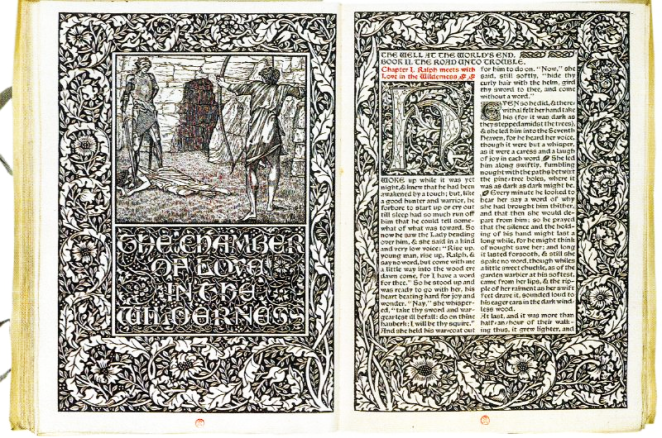
The story follows a young prince, Ralph, the fourth son of the king of a little land called Upmeads. When he is chosen to stay and rule the kingdom while his brothers earn fame and glory, Ralph runs away on his own journey. Along the way he hears whispers and legends of the well at the world’s end, and through many adventures, determines that he must journey to it if it exists. It’s the story of Ralph’s coming of age as he discovers love, honor, loss, glory, and that people are not always what they seem. The Lady of Abundance, Ursula, Bull shockhead, Richard, the Champions of the Dry Tree, and Gandolf all add richness to the story, showing their own characters’ and surprising the reader. As the pages turn, Ralph grows and matures in front of your eyes. At the end, I was proud of him and hope that when I have a son, he turns out like Ralph.
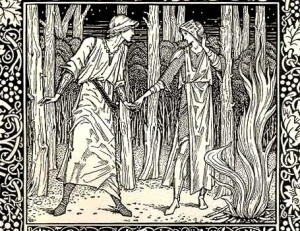 The Well at the World’s End encourages me to continue to grow and mature. Ralph’s young heart was restless, so he went out and did the things he desired. But at the end, when he has completed those tasks, his desires shift. It’s not that those desires were bad and he needed to grow up, rather they lead him to where he needs to go. As someone who’s likely in the same stage of life as Ralph, I’m inspired to go on adventures and enter worlds beyond my own “Upmeads” with the hope of coming home some-day.
The Well at the World’s End encourages me to continue to grow and mature. Ralph’s young heart was restless, so he went out and did the things he desired. But at the end, when he has completed those tasks, his desires shift. It’s not that those desires were bad and he needed to grow up, rather they lead him to where he needs to go. As someone who’s likely in the same stage of life as Ralph, I’m inspired to go on adventures and enter worlds beyond my own “Upmeads” with the hope of coming home some-day.
– Richie Gowin
Music: Photographs and Memories by Jim Croce
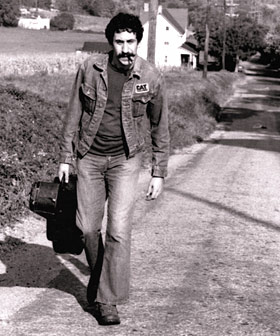 According to its release date this isn’t from 2016, but that’s when I found it. This year the
According to its release date this isn’t from 2016, but that’s when I found it. This year the
music I was hearing made me feel a little like Bing Crosby’s character in White Christmas: “everyone’s got an angle.” Artists either focused on a specific subject, or a specific mood, or the intensity of a certain experience. With Jim Croce, there’s no angle. He’s what would once have been called “just folks.” It’s remarkable how comforting that can be.
I know it’s considered a bit on the nose to recommend greatest hits albums, but after listening to Croce’s whole oeuvre, this is the one I returned to consistently. It’s plain and simple about everything: heartbreak (“Operator” and “Lover’s Cross”) the defeat of local bullies (“Bad Bad Leroy Brown” and “You Don’t Mess Around with Jim”), a job you don’t want (“Workin’ at the Car Wash Blues”), love and infatuation (“I Have to Say I Love You In A Song” and “Roller Derby Queen”), hating where you live (“New York’s Not My Home”) and just wanting company (“I Got a Name”). In 2016, when I just wanted company, I turned on this album. In 2017, I’ll probably do the same.
Full album on youtube here.
– David Shelton
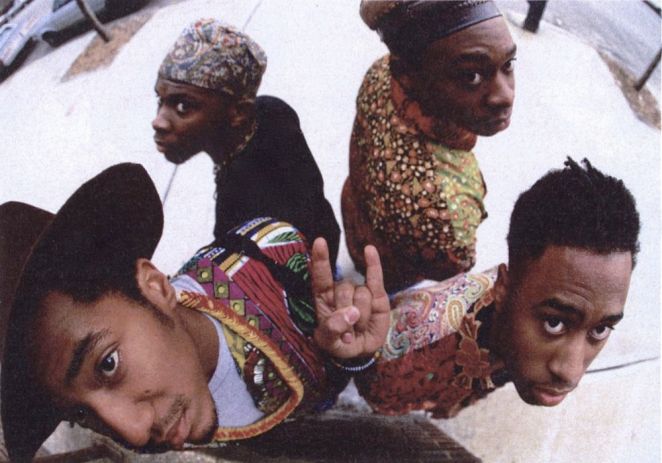
Music: We Got It from Here…Thank you 4 Your Service by A Tribe Called Quest
2016 was an amazing year for music. Hundreds of albums were released and the hip-hop, rap, R&B, soul world boomed. Beyoncé created the stunning visual album Lemonade, her sister Solange released an incredibly thought provoking a timely album entitled A Seat at the Table, Young Thug gave us Jeffery, and Gallant produced a beautiful soul album called Ology. While these are all in my list of favorite albums from this year, the top place has to go to A Tribe Called Quest (ATCQ) who released We Got it From Here…Thank you 4 Your Service. Following a rough breakup and years without new work this album seemed unlikely to be realized. The group produced 5 studio albums and are known for their forward-thinking innovations and unusual sampling choices. 18 years later they released their sixth and final album We Got it From Here. The process of finishing the album was colored by the death of one of the group’s four members, Phife Dawg, making the release a tribute to him as well.
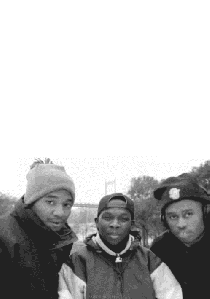
While musician’s reunions are often met with excitement by their fans they are also frequently disappointing. These attempts can be forced, rely heavily on nostalgia, and leave listeners thinking “they just ain’t what they used to be” (like the fourth Indiana Jones movie…ugh). This album does none of that. While the style from ATCQ’s early work shines through, the music and lyrics are decidedly fresh and piercingly relevant. Songs like “The Space Program” and “We the People” comment on racial inequality and the contradictory intolerance of America on display in the events of this year. The artists call out injustice in songs like “Killing Season”: “I swear it’s killing season / Cause killin’ is still in season” “Things haven’t really changed/ Or they’re dormant for the moment” and “Movin Backwards”: “Po puts braces on my wrists like he was clapping his hands / How demeaning y’all? Who could be blind to racism?” The music that makes up this album stands as a strong independent work in the world of rap/hip-hop and perfectly polishes ATCQ’s indelible body of work.
The album features guest artists including Kendrick Lamar, Jack White, André 3000, Kanye West, and Busta Rhymes. ATCQ continues their sampling prowess integrating audio from diverse sources including Willy Wonka & the Chocolate Factory, Elton John’s Benny and the Jets, Michael Jackson’s Thriller, and Behind the Wall of Sleep by Black Sabbath.
Read more:
– Jessica Webster

